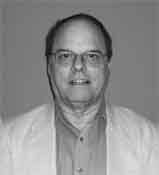 | John Chastain, M.S.,EdS., is Director of Patient Care for the Parsons office of Hospice Care Of Kansas and adjunct professor at Labette Community College. He his a native of southeast Kansas and graduated from Pittsburg State University with a masters degree in psychology and an education specialist degree. John is also an ordained minister, receiving his bachelors degree in theology from Central Bible College in Springfield, Missouri. |
Hospice
2011-07-01 10:51:00
Compassion, caring and coping
will arise and there are just no answers. And whether we want to accept it or not, we will all face this experience sometime in our life, either with ourselves or with someone we really love. That is when you should involve your doctor, family and hospice.
Why involve hospice? Contrary to what many people think, hospice is not a death sentence. I prefer to call it “Hope Renewed”. A team of professionals comes in to help you physically, emotionally and spiritually. We believe that people should live life to the fullest as long as they possibly can. I have found that many times the family is having a harder time than the patient and they need the help, love and support of the entire hospice team. That is what we are here for. The hospice team has been trained professionally to fulfill their individual calling. But it is more than professional training.
It is a wonderful privilege we are given to share some “sacred” moments with both the patient and the family in perhaps one of the most difficult times in their lives. We consider this a high and sacred calling.
Some of the greatest experienc
Answer: Years ago, I became involved in hospice work. My first experience in hospice
was unforgettable. A man who was angry because he was dying was determined
to make life miserable for everyone, especially his family. However, not long afterward
I visited another lady on hospice service who inspired me and all who were around her. She was determined to not let this disease destroy her. She was going to live life to
its fullest, however long that might be. Every day was a celebration of life for her and
she taught us all so many valuable lessons. She lived seven months longer than the doctor expected, with her pain controlled and her family at her side.
Some things in life are not our fault. You didn’t plan to get sick. You may say, “Why is this happening to me? It’s not fair.” At first there may be some denial, and maybe even a little bargaining. Mix in with that some fear and anger. You may even blame yourself for not taking better care of your health. Questions will arise and there are just no answers. And whether we want to accept it or not, we will all face this experience sometime in our life, either with ourselves or with someone we really love. That is when you should involve your doctor, family and hospice.
Why involve hospice? Contrary to what many people think, hospice is not a death sentence. I prefer to call it “Hope Renewed”. A team of professionals comes in to help you physically, emotionally and spiritually. We believe that people should live life to the fullest as long as they possibly can. I have found that many times the family is having a harder time than the patient and they need the help, love and support of the entire hospice team. That is what we are here for. The hospice team has been trained professionally to fulfill their individual calling. But it is more than professional training.
It is a wonderful privilege we are given to share some “sacred” moments with both the patient and the family in perhaps one of the most difficult times in their lives. We consider this a high and sacred calling.
Some of the greatest experiences of my life have been in hospice. A person who is facing end-of-life issues has nothing to hide. To the contrary, they are eager to bring closure to areas of their life they have long ago “swept under the carpet”. It is now time to be transparent and open about everything. Years ago, I served as a hospice chaplain and I often became a sounding board or a listening ear for my patients. Some of what patients have confided has been shocking, and yet this time of confession became a “freeing” time for many of them. I have seen families come together and resolve family issues that had been destroying their family for years. These types of resolutions are as important as our nursing/clinical treatment of the patient. They can now face either life or death with a clear conscience. What a blessing this is for all concerned!
Next month we will talk about where hospice care takes place.


